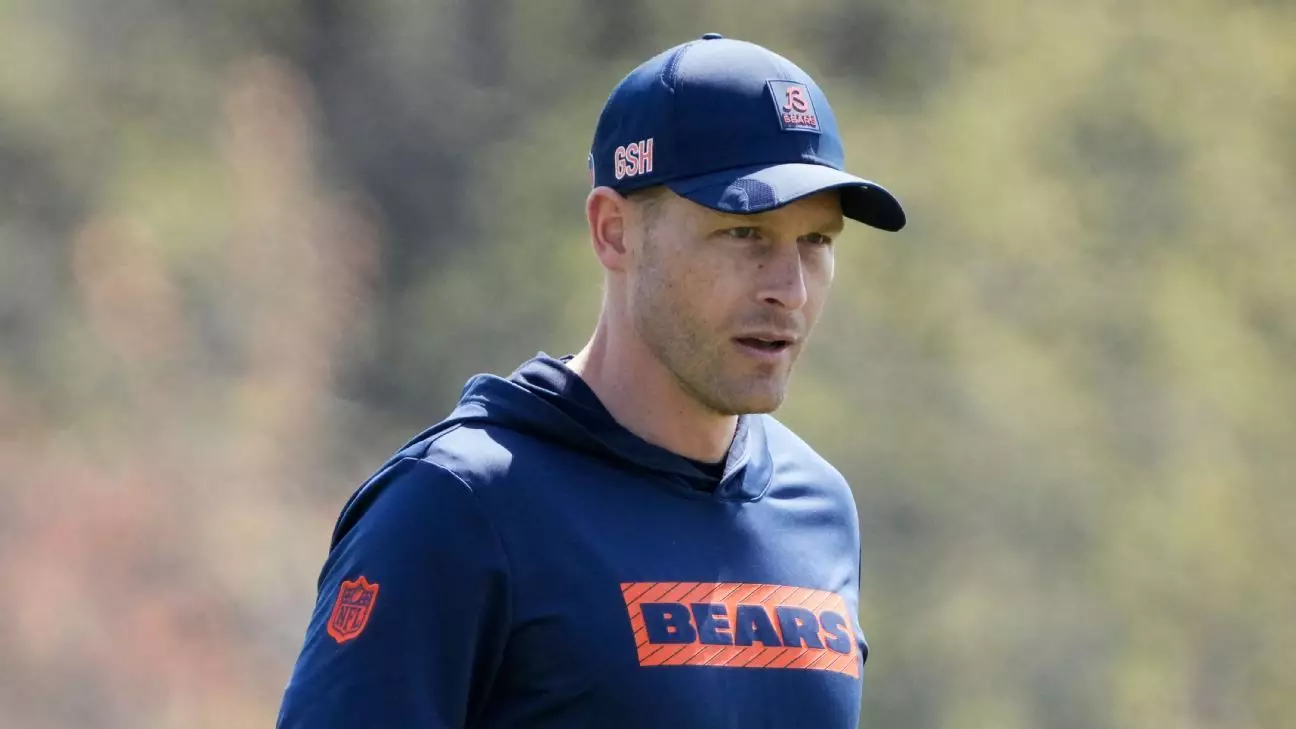The Chicago Bears have long been mired in a history of frustration when it comes to developing quarterbacks. This storied franchise, steeped in tradition, has paradoxically become synonymous with quarterback failures. New head coach Ben Johnson, however, sees this history not as a burden but rather as a unique opportunity—a chance to redefine the narrative surrounding the franchise’s signal-callers. His enthusiastic and optimistic demeanor shines through as he acknowledges the less-than-stellar past while striving to create a brighter future.
Recent coverage from ESPN’s Seth Wickersham, especially excerpts from his revealing book “American Kings: A Biography of the Quarterback,” paints a bleak picture surrounding rookie quarterback Caleb Williams’ experiences in Chicago. The pressures faced by a first-round draft pick can be daunting, but Williams’ early television exposure raises even more eyebrows, revealing the fears not only of the player but also of his father, Carl Williams. Expressing concerns about the franchise’s environment, Carl famously stated that Chicago is a place where “quarterbacks go to die,” which is hard to unpack when relating to a young man’s career.
Rewriting a Misguided Narrative
Johnson has taken the reins with unwavering confidence, and his reaction to the negative sentiment surrounding the organization was aptly characterized by his signature smile. “I love it,” Johnson said, ready to tackle the challenge head-on. This reaction points not only to his familiarity with the animosity surrounding the Bears’ quarterback history, but it also suggests his belief that this is not merely a task, but rather an exciting venture toward crafting a triumphant new chapter. By referring to the 2025 season as a clean slate, Johnson places the bricks for change at his feet, suggesting that every day is a new chance to prosper.
What stands out is how Johnson discusses his rapport with Caleb Williams. The dialogue he shared with Williams post-excerpt is crucial in establishing a foundation based on mutual respect and understanding. Johnson expressed eagerness to pivot from past failures and focus on the pressing needs of the present. In doing so, he fosters an environment where Williams can be viewed and treated as an individual, rather than just another cog in a broken system. This approach represents a critical shift from the past, where players often felt more like investments than people.
Building Trust through Development
One of the more troubling aspects mentioned in Wickersham’s report is the disconnect between Williams and former offensive coordinator Shane Waldron. The idea of a rookie quarterback reviewing film in isolation is alarming and raises questions about how this reflects on leadership within the organization. Johnson seems wise to the importance of accountability and guidance—a deft contrast to the solitary experience Williams faced during his rookie season. The eagerness shown by both the coach and his quarterback indicates a shared vision that aligns well with team growth.
Johnson acknowledges that building a relationship based on trust requires time. This insight speaks volumes about his character as a leader and reflects a contrasting era of impulsiveness when teams often expect results at the snap of a finger or the signing of an endorsement deal. The emphasis on earned rapport signifies a depth of understanding in Johnson’s coaching philosophy. It’s clear he values the development of not only Williams but the entire Bears roster.
The Larger Picture: Culture Shift Ahead
Johnson’s tenure as the former offensive coordinator for the Detroit Lions adds another layer to his approach. Having witnessed how a positive team culture can lead to improved performances, he seems ready to replicate that success within Chicago’s storied but troubled confines. The emphasis on a learning-oriented environment will not only help Williams become a more formidable quarterback but will inject optimism into a fanbase desperately yearning for a resurgence.
Setting a new standard is no small feat, especially when the past looms large like a shadow. Johnson’s vision for the Bears can transform not just the quarterback role, but potentially the entire culture of the franchise. Under his leadership, the prospects for the Chicago Bears seem brighter, and the momentum for positive change solidifies with every interaction between him and Williams. The nascent opportunity for growth is palpable, leaving die-hard fans with a flicker of hope that the Bears may finally rise from a historical quagmire and greet the prospect of a fresh, empowering narrative.

